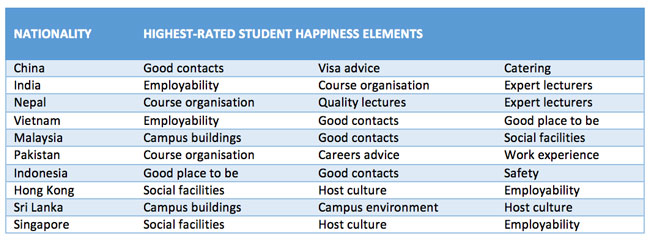What makes international students happy? Research shows the answer depends in part on country of origin
As the number of international students enrolled in higher education worldwide has skyrocketed in the past two decades, increasing from two million in 1999 to around five million at present, understanding what impacts their experience on campus is key to promoting student wellbeing and attracting international students. Responses to the 2018 International Student Barometer (ISB) survey at universities in Australia - one of the top host countries for international students - shed light on what aspects of the learning and living experience matter most in determining respondents’ happiness with their life as an international student.
In 2018, 56,376 international students studying at 35 universities in Australia took part in the ISB, a survey tracking the motivations, decision-making, and well-being of international students during their studies. Students from over 100 countries responded to the survey, with responses from the top ten nationalities used as the basis for analysis of factors that contribute most to student happiness. Survey respondents were asked: “Overall, how happy are you with your life at the university at this stage in the year?” with response options “very unhappy,” “unhappy,” “happy,” and “very happy.” Correlation analysis was undertaken to determine the strength of the relationship between responses to this question and satisfaction scores for all elements of the overseas study experience.
In 2018, the top five elements that most frequently appeared in the highest correlations with international student happiness were “making good contacts for the future” (Good contacts), “learning that will help me to get a good job” (Employability), “the organisation and smooth running of the course” (Course organisation), “the social facilities” (Social facilities), and “the design and quality of the campus buildings” (Campus buildings).
Students who had high satisfaction with these aspects of their experience were likely to also report a high level of happiness with their overall study experience. The converse is also true - those with low satisfaction in these areas were more likely to report lower happiness with their study experience.
The top three most influential elements highlight the importance of employability skills, future job prospects, and the learning experience; while the final two reveal that the campus environment and students’ surroundings do impact their happiness. Though institutions searching for a recipe for international student happiness may be tempted to beef up career-related services, expand networking opportunities, and beautify the campus, digging deeper into the data reveals that happiness is impacted by different elements depending on student characteristics, including nationality.
For example, for undergraduate students from China, who comprised 5409 of the ISB respondents in this study, and represent Australia’s leading sending market, the top three elements impacting happiness were “making good contacts for the future,” “immigration and visa advice from the institution,” and “campus eating places.” Qualitative comments from students in the survey shed light on why they are concerned with campus eating options: many seek food that is affordable and healthy; and some lament the lack of food from their home countries or lack of options for students with dietary requirements (for example, vegetarian or Halal cuisine).
Responses from students from India, the second-largest undergraduate sample in the Australian ISB (1,215 respondents) and second largest source of Australian universities’ international enrolments, reveal another area with a high impact on happiness - “the subject area expertise of lecturers/supervisors” bears 40% correlation with the happiness of students from India.
For other nationalities, different aspects of their overseas study experience are influential: for example, for Nepalese students, the “quality of lectures” was strongly linked to happiness; while for Vietnamese students “the surroundings outside the institution” were more important. For Pakistani students, the “opportunity to work while studying” played a key role in determining happiness.

















